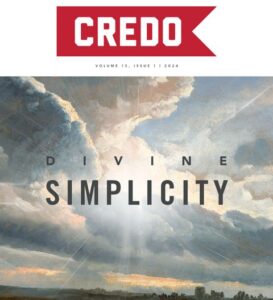Why should Christians should believe in Divine Simplicity?
First, Divine Simplicity is foundational to a Biblical doctrine of God. So, in the Bible, God is portrayed as supreme, unrivaled, and transcendent. You think of God revealing his name to Moses as “I am who I am” or the Apostle Paul saying that all things are from and through and to God. Throughout the Book of Isaiah, you think of these repeated declarations from God that “I alone am God, I am the first and the last, there is no one like me,” etc. It’s from those kinds of passages that Christians have always affirmed God’s ameaning God exists from himself, God is not derived from anything external to himself, and God’s absoluteness meaning God is not conditioned by anything external to himself. And Divine Simplicity is important to uphold both of those doctrines as well as the general transcendence of God.
Simplicity simply means that God is not made up of parts, God is not broken down into more basic ontological constituents, God is His attributes. So God is not merely loving and righteous but love and righteousness. And if we don’t say that, if God merely instantiates His attributes, then in some sense they would exist independently of Him. God would not be utterly absolute and self-determined. It’d be like love and righteousness are just floating out here somehow, and then God comes along and just happens to correspond to them. That won’t do. So, Divine Simplicity is necessary to protect the godness of God.
Second, Divine Simplicity is a nearly universal part of Christian witness and worship. Basically, among all Christians at all times, the great historical theologian Richard Muller calls Divine Simplicity one of the normative assumptions of theology, basically in every era of church history. Divine Simplicity is one of the normative assumptions of theology, basically in every era of church history. Share on X It’s a kind of consensus doctrine and not merely so as a philosophical appendage but as a vital part of the witness of the church and the worship of the church.
For example, in the late 2nd Century, in his defense to the Roman emperors Marcus Aurelius and Lucious Commodus, yes, the emperors in the movie Gladiator, the early Christian apologist Athenagoras used Divine Simplicity to distinguish Christian theism from the polytheism of the day. He just assumed that’s part of the Christian conception of God. Later, among the church fathers, Divine Simplicity was everywhere put to use to ground trinitarianism as monotheistic. More on that in a moment.
In the Medieval Era, Divine Simplicity was the first thing that Thomas Aquinas sought to establish about God after proving that He exists in the Summa Theologica. In Bonaventure’s mystical theology, Divine Simplicity was so important for establishing that God can communicate with creatures. You know, a lot of modern theologians seem to have this idea that Divine Simplicity is a kind of static doctrine slicing God off from meaningful relationship to creatures. But pre-modern theologians had the exact opposite instinct. Sum it up like this: Herman Bavinck, the great Reformed theologian, basically said Christian theology has always been conscious of its calling to teach God’s Simplicity. This is simply how we’ve always worshiped God.
Third, Divine Simplicity establishes the Trinity as monotheistic, meaning we believe in one God. This is one of the great challenges against us if we believe in the Trinity, that there are three persons in the godhead. How can we still believe in only one God? Well, in recent years, a lot of theologians have tried to use this idea of perichoresis to address this concern. Perichoresis means interpenetration or mutual indwelling among the Divine persons. Some people use it also for the two natures of Christ. So, Jurgen Moltmann’s social trinitarianism, for example, went that route.
But the traditional way of resolving this challenge, in response to early heretics but then later on in response to Jewish and Muslim criticism, was Divine Simplicity. The Trinity is under fire today and this is what we need today as well to defend the Trinity. Augustine makes this move all throughout De Trinitate. He’s basically saying if God is not simple, then each individual member of the godhead is less than fully God. If God is not simple, then each individual member of the godhead is less than fully God. Share on X The Cappadocian fathers in the East make a similar argument. John of Damascus, after them, says the reason we don’t have three Gods is because the divine nature is simple rather than compound. And that makes sense because if all you have is perichoresis (and I’m not denying perichoresis is true), if that’s your only explanatory mechanism, then you have to say why we don’t have three interpenetrating Gods. What is needed is not simply a mechanism for binding the three persons into each other but into the one Divine Essence. And so the doctrine of Divine Simplicity is a resource for us in defending the Trinity today. That’s been the way it’s been done.
So, in summary, Divine Simplicity is important because it’s basic to who God is, it’s always been how Christians have worshiped God, and it’s key to understanding how the Father, the Son, and the Spirit constitute one God.
Image credit: sswj


